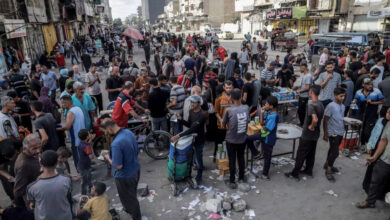Horrific accounts of torture, rape and organ theft are continuing to emerge from Egypt’s Sinai desert, seven rights organizations said last week in a press statement.
Human trafficking networks operating in northern Sinai detain migrants and hold them in what the rights organizations describe as “torture camps” until relatives pay a ransom.
The statement says that despite the “chilling evidence of horrors” inflicted on refugees — mostly fleeing Eritrea and Sudan — in detention, little has been done to rescue them.
It rebuts claims made by CNN in November that a large number of refugees had been released from Sinai camps. These reports, they say, represent only a “partial picture of the current situation on the ground.”
Smuggling networks are “still up and running and hundreds of refugee hostages are being tortured by human traffickers in Sinai,” with the objective of obtaining tens of thousands of dollars in random money for their release.
Authorities have struggled to maintain control of North Sinai since Egypt's revolution began in January and the security vacuum has been exploited both by radical Islamists who have taken up arms, and some Bedouins who are cashing in on a lucrative human trafficking trade, smuggling migrants across the border to Israel.
The statement provides grim details of refugees’ experiences while being held hostage in Sinai. These details have emerged while refugees are still in detention, via satellite phones provided by their captors to call relatives and demand ransom money.
Five groups of hostages are currently being held.
One group of 165 Eritrean refugees is under the control of a group of eight traffickers led by an individual known as Abu Musa. This group is not in Sinai but the Delta governorate of Mansoura, and has been held for several months in a bunker, according to the report.
One refugee told the Hotline for Migrant Workers, one of the groups behind the statement, that smugglers beat and electroshock their victims in order to raise ransom money — set at US$30,000. He added that the group has not left the bunker since they arrived, but that the women are taken out every night and raped.
Five prisoners died as a result of electrocution in one week, the statement says.
Members of another group of 59 people told the Italian Agenzia Habeshia, another of the seven rights groups, that two of their members are in late-term pregnancy, and one, who is seven-months pregnant and was kidnapped from Sudan, has been raped “many times.”
When she was unable to pay the smugglers in Sudan the $3,000 they were demanding for her release she was sold to other smugglers.
“The current smugglers are demanding $23,000 and have made it clear that if she does not come up with the money by the time of her delivery, she will be forced to pay an additional $23,000 for the infant,” the statement says.
Several details are known about members of the smuggling operation, it says, including the names of several prominent members whose names are often repeated by victims.
One member, Abu Musa, is believed to work with the assistance of an Eritrean living in Israel, while another, Abu Abdalla, works closely with an Eritrean man known as Cornell, who is “responsible for collecting ransom money sent to Egypt by hostages’ relatives and for managing a network of collaborators in Israel,” the statement says.
In Khartoum, an Eritrean man called Angosom has kidnapped hundreds of Eritreans from refugee camps in Sudan and Ethiopia and sold them to human traffickers in Egypt.
The Arabic edition of Al-Masry Al-Youm reported last month an even more sinister dimension to Sinai’s human trafficking industry. Traffickers are stealing the organs of the refugees they kidnap, it reported, adding that there were violent confrontations in central Sinai as the Tayaha tribe accused members of the Nakhalwa tribe of stealing organs.




